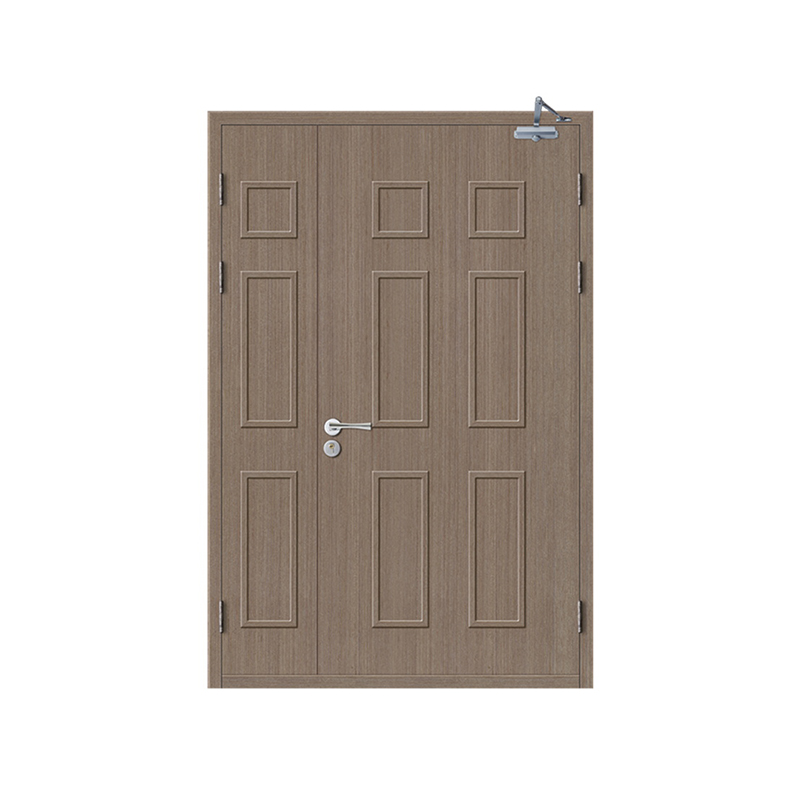We provide quality products and services to customers from all over the world.
Fire-Rated Doors vs. Fire-Proof Front Doors: Choosing the Right Protection for Your Property
When it comes to fire safety, selecting the right door can be the difference between containment and catastrophe. Two critical options—fire-rated doors and fire-proof front doors—serve distinct roles in protecting buildings from flames and smoke. While both enhance safety, their design, certifications, and applications differ significantly. This guide explores three key factors—fire resistance standards, material construction, and ideal use cases—to help you make an informed decision.
1. Fire Resistance Standards: What Do Certifications Mean?
Fire-rated doors are rigorously tested to withstand fire for a specified duration, typically 30, 60, or 90 minutes, following standards like NFPA 80 (U.S.) or EN 1634 (EU). These doors are mandatory in commercial buildings, stairwells, and corridors to slow fire spread and allow safe evacuation.
On the other hand, fire-proof front doors are often marketed as ultra-resistant but may lack standardized ratings unless independently tested. True fire-proof front doors should meet Class A or B fire ratings, ensuring prolonged resistance to heat and flames.
Key Insight:
- Fire-rated doors guarantee compliance with legal safety requirements.
- Fire-proof front doors may offer good protection but must be verified for certification.

2. Material Construction: How Do They Resist Fire?
The effectiveness of a fire-rated door lies in its steel or solid timber core, paired with intumescent seals that expand under heat, sealing gaps to block smoke and flames. Some models include fire-resistant glass for visibility without compromising safety.
Fire-proof front doors, however, often use multiple layers of steel, reinforced frames, and mineral or ceramic cores to withstand direct exposure to fire. High-end versions may incorporate fire-resistant insulation to prevent heat transfer, making them ideal for external threats like wildfires.
Key Difference:
- Fire-rated doors focus on containment—delaying fire spread within a building.
- Fire-proof front doors prioritize direct fire defense, making them stronger against external hazards.
3. Application Suitability: Where Should Each Be Installed?
Fire-Rated Doors: Best for Internal Use
- Commercial buildings (offices, hospitals, schools)
- Apartment complexes (hallways, stairwells)
- Industrial facilities (fire escape routes)
These doors are designed to compartmentalize fires, giving occupants more time to evacuate and emergency responders better control.
Fire-Proof Front Doors: Ideal for External Entry Points
- Residential homes in wildfire-prone areas
- High-security buildings (banks, data centers)
- Industrial sites with flammable material storage
Since fire-proof front doors face external fire risks, they are built to endure prolonged exposure rather than just slow internal fire spread.
Best Practice:
For more safety, combine fire-proof front doors at main entrances with fire-rated doors internally—creating a dual-layer defense.
Which One Do You Need?
- Choose a fire-rated door if you need code-compliant, internal fire containment (e.g., offices, apartment buildings).
- Opt for a fire-proof front door if your property faces external fire risks (e.g., wildfires, industrial hazards).
- For good protection, use both—fire-proof front doors to block external threats and fire-rated doors inside to control fire spread.
Whether you select a fire-rated door or a fire-proof front door, the right choice depends on your building's specific risks and regulatory needs. By understanding their differences in certifications, materials, and applications, you can enhance safety and ensure compliance. Investing in the correct door today could prevent devastating losses tomorrow.
Make an informed decision—your property's safety depends on it.
Interested in cooperation or have questions?
![]() +86-13857003056
+86-13857003056
![]() No. 27 Lianhuashan Avenue, Jiangshan Economic Development, Jiangshan, Quzhou, Zhejiang, China
No. 27 Lianhuashan Avenue, Jiangshan Economic Development, Jiangshan, Quzhou, Zhejiang, China

 English
English русский
русский Français
Français Español
Español عربى
عربى
